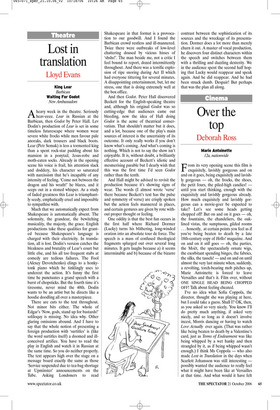Lost in translation
Lloyd Evans
King Lear Barbican Waiting For Godot New Ambassadors Aheavy week in the theatre. Seriously heav-eeee. Lear in Russian at the Barbican, then Godot by Peter Hall. Lev Dodin’s production of Lear is set in some timeless futurescape where women wear severe white frocks while men favour pale anoraks, dark trousers and black boots. Lear (Petr Semak) is less a tormented king than a spent rock-star padding about his mansion in a ponytail, Jesus-robe and moth-eaten socks. Already in the opening scene his voice is frail, his attention slack and doddery, his character so saturated with narcissism that he’s incapable of any intensity of feeling. ‘Come not between the dragon and his wrath!’ he blares, and it seeps out in a stoned whisper. As a study of faded greatness this Lear is triumphantly seedy, emphatically cruel and impossible to sympathise with.
Much that we automatically expect from Shakespeare is automatically absent. The solemnity, the grandeur, the bewitching musicality, the majesty, the grace. English productions take these qualities for granted because Shakespeare’s language is charged with their electricity. In translation, all is lost. Dodin’s version catches the bleakness and brutality of Lear’s court but little else, and his all too frequent stabs at comedy are tedious failures. The Fool (Alexey Devotchenko) clings to a honkytonk piano which he tinklingly uses to undercut the action. It’s funny the first time he punctuates a grand speech with a burst of chopsticks. But the fourth time it’s tiresome, never mind the 40th. Dodin wants to be an artist but he directs like a hoodie doodling all over a masterpiece.
There are cuts to the text throughout. Not minor bits either. The whole of Edgar’s ‘Now, gods, stand up for bastards!’ soliloquy is missing. No idea why. Other glaring omissions abound. And I have to say that the whole notion of presenting a foreign production with ‘surtitles’ is (like the word surtitles itself) a doomed and illconceived artifice. You have to read the play in English and watch it in Russian at the same time. So you do neither properly. The text appears high over the stage on a message board exactly the same as those ‘Service suspended due to tea-bag shortage at Upminster’ announcements on the Tube. Asking Londoners to read Shakespeare in that format is a provocation to our goodwill. And I found the Barbican crowd restless and ill-mannered. Twice there were outbreaks of low-level chattering doused by vicious hisses of ‘shshs!’. The man beside me, not a critic I feel bound to report, dozed intermittently throughout. And there was a terrific explosion of ripe snoring during Act II which had everyone tittering for several minutes. A disappointing entertainment, but, let me stress, one that is doing extremely well at the box office.
And then Godot. Peter Hall discovered Beckett for the English-speaking theatre and, although his original Godot was so cutting-edge that audiences came out bleeding, now the idea of Hall doing Godot is the acme of theatrical conservatism. That shouldn’t matter but it does, and a lot, because one of the play’s main sources of interest is the uncertainty of its outcome. It only really works if you don’t know what’s coming. And what’s coming is nothing. Which is not to say the show isn’t enjoyable. It is, without doubt, a brilliantly effective account of Beckett’s idiotic and mesmerising parable but I dearly wish that this was the first time I’d seen Godot rather than the tenth.
And Hall might be advised to revisit the production because it’s showing signs of wear. The words (I almost wrote ‘verse’ there because Beckett’s text has the pulse and symmetry of verse) are crisply spoken but the action feels mannered in places, and certain gestures are given by rote without proper thought or feeling.
One oddity is that the best fun occurs in the first half where Richard Dormer (Lucky) turns his blithering, long-winded oration into an absolute tour de force. The speech is a mass of confused theological fragments splurged out over several long minutes. It gets laughs because a) it seems interminable and b) because of the bizarre contrast between the sophistication of its sources and the wreckage of its presentation. Dormer does a lot more than merely churn it out. A master of vocal production, he discovers four distinct characters within the speech and switches between them with a thrilling and dazzling dexterity. We in the audience spent the second half hoping that Lucky would reappear and speak again. And he did reappear. And he had been struck dumb. Despair! But perhaps that was the plan all along.


































































































 Previous page
Previous page